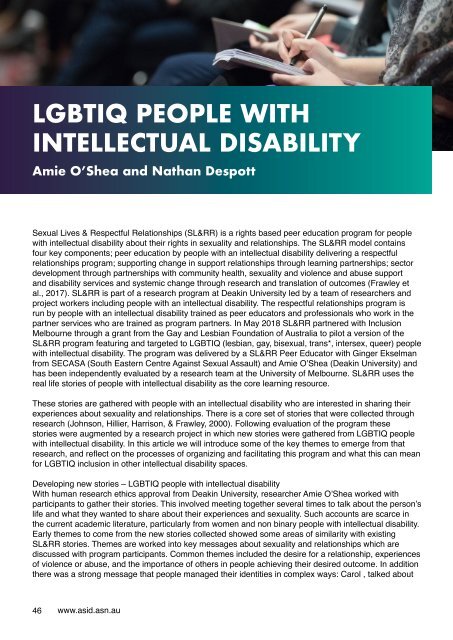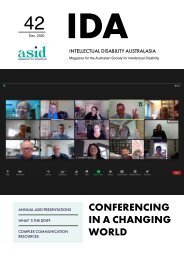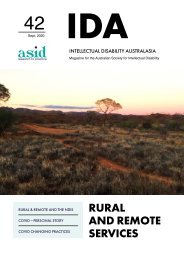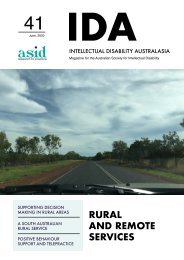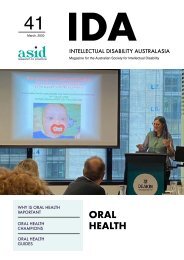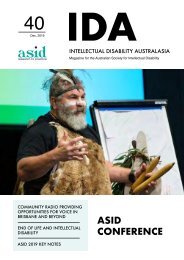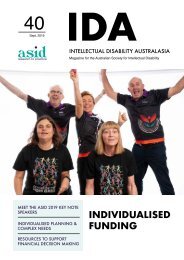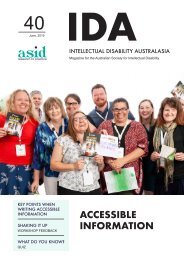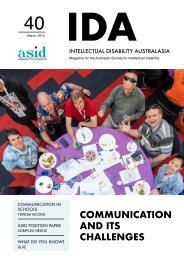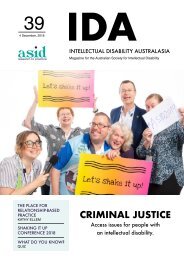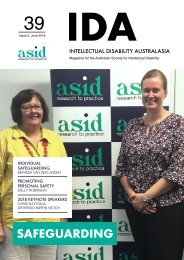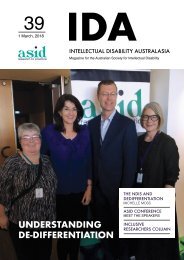IDA Magazine Vol 39 Iss 3 (Sept 2018)
Create successful ePaper yourself
Turn your PDF publications into a flip-book with our unique Google optimized e-Paper software.
LGBTIQ PEOPLE WITH<br />
INTELLECTUAL DISABILITY<br />
Descriptive Sub-title Descriptive Sub-title Descriptive<br />
Sub-title.<br />
Amie O’Shea and Nathan Despott<br />
Sexual Lives & Respectful Relationships (SL&RR) is a rights based peer education program for people<br />
with intellectual disability about their rights in sexuality and relationships. The SL&RR model contains<br />
four key components; peer education by people with an intellectual disability delivering a respectful<br />
relationships program; supporting change in support relationships through learning partnerships; sector<br />
development through partnerships with community health, sexuality and violence and abuse support<br />
and disability services and systemic change through research and translation of outcomes (Frawley et<br />
al., 2017). SL&RR is part of a research program at Deakin University led by a team of researchers and<br />
project workers including people with an intellectual disability. The respectful relationships program is<br />
run by people with an intellectual disability trained as peer educators and professionals who work in the<br />
partner services who are trained as program partners. In May <strong>2018</strong> SL&RR partnered with Inclusion<br />
Melbourne through a grant from the Gay and Lesbian Foundation of Australia to pilot a version of the<br />
SL&RR program featuring and targeted to LGBTIQ (lesbian, gay, bisexual, trans*, intersex, queer) people<br />
with intellectual disability. The program was delivered by a SL&RR Peer Educator with Ginger Ekselman<br />
from SECASA (South Eastern Centre Against Sexual Assault) and Amie O’Shea (Deakin University) and<br />
has been independently evaluated by a research team at the University of Melbourne. SL&RR uses the<br />
real life stories of people with intellectual disability as the core learning resource.<br />
These stories are gathered with people with an intellectual disability who are interested in sharing their<br />
experiences about sexuality and relationships. There is a core set of stories that were collected through<br />
research (Johnson, Hillier, Harrison, & Frawley, 2000). Following evaluation of the program these<br />
stories were augmented by a research project in which new stories were gathered from LGBTIQ people<br />
with intellectual disability. In this article we will introduce some of the key themes to emerge from that<br />
research, and reflect on the processes of organizing and facilitating this program and what this can mean<br />
for LGBTIQ inclusion in other intellectual disability spaces.<br />
Developing new stories – LGBTIQ people with intellectual disability<br />
With human research ethics approval from Deakin University, researcher Amie O’Shea worked with<br />
participants to gather their stories. This involved meeting together several times to talk about the person’s<br />
life and what they wanted to share about their experiences and sexuality. Such accounts are scarce in<br />
the current academic literature, particularly from women and non binary people with intellectual disability.<br />
Early themes to come from the new stories collected showed some areas of similarity with existing<br />
SL&RR stories. Themes are worked into key messages about sexuality and relationships which are<br />
discussed with program participants. Common themes included the desire for a relationship, experiences<br />
of violence or abuse, and the importance of others in people achieving their desired outcome. In addition<br />
there was a strong message that people managed their identities in complex ways: Carol , talked about<br />
46 www.asid.asn.au


